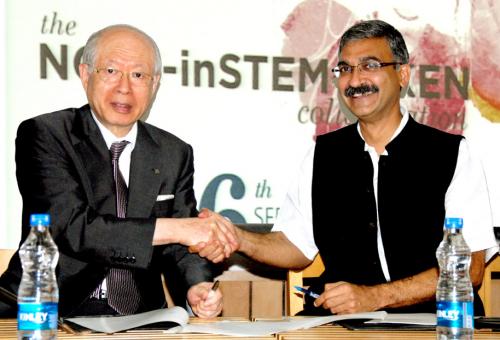NCBS and RIKEN hold hands to launch Joint Research Center
Globalization has rapidly been shrinking the world in general and the scientific world in particular. It is with this vision that Ryoji Noyori, President, RIKEN, Japan's largest multidisciplinary research organization and the 2001 Chemistry Nobel-laureate sees his recent collaboration with NCBS and its allied institutions to launch a joint research center.
The new center, set up in the backdrop of a ten-year collaboration between NCBS, its allied institutions and the RIKEN Center for Developmental Biology, two Asian powerhouses of research and innovation, will expand on the scope of research undertaken previously, to include life sciences, material science and computational biology. The center launched via a Memorandum of Understanding (MoU) signed on September 16 at NCBS includes NCBS' allied institutions: the Bangalore Bio-cluster, comprising NCBS, The Institute of Stem cell biology and Regenerative Medicine (InStem) and The Center for cellular and Molecular platforms (C-CAMP) in its fold.
"People's stream of knowledge used to be just vertical previously, with teachings being handed down generations locally, but now it needs to be both vertical and horizontal, fostering much more cultural collaboration," said Noyori. "Brain circulation across disciplines and diverse backgrounds is critical to good science."
Ryoji Noyori accompanied by a Japanese delegation of senior RIKEN scientists including Kenji Oeda, Executive-director, Group directors Shigeo Hayashi and Shigeru Kuratani from the Center for Developmental Biology and Hitoshi Okamoto, Deputy-director, Brain Science Institute met with Satyajit Mayor, Director, NCBS, Upinder Bhalla, Dean, NCBS, and Apurva Sarin, Head, Academics, NCBS at the Bangalore Bio-Cluster to launch the joint center.

Prof Satyajit Mayor, Director of NCBS and Prof Ryoji Noyori, President of RIKEN seen launching the new joint research centre.
"NCBS has expanded in the versatility of its research groups, with topics ranging from single cells to ecology and evolution and InStem and C-CAMP provide the environment for scientific exchanges both at a fundamental and translational level," said Mayor in his address to the gathering. "Establishment of the new center allows researchers from our campus to explore substantive collaborations with excellent scientists ranging from the computational to those exploring the wiring of the brain to physicists who study material properties using cutting-edge tools."
The new center also serves as a common platform for exchange of post-doctoral researchers and doctoral students which will facilitate a two-way exchange of scholars between RIKEN and NCBS, InStem and C-CAMP.
"RIKEN's research is among the most multi-disciplinary anywhere --- ranging from biosciences, chemistry, physics and material science to medical science," said Noyori. "Likewise, India's strength is in its inter-disciplinary nature of research, across physics, chemistry and biology, something difficult for any country to do - so we would like to tap into that capacity fully."
"RIKEN has expertise in bridging basic biology with engineering, and that I think is something we will benefit substantially from," agrees S Ramaswamy, Dean, InStem.
Mayor envisages that areas of exchange would broadly include cell and development biology and stem cell research, with the long-term goal of regenerating or replacing damaged tissues or organs, with specific projects to be worked out.
The enthusiasm in the Bio-cluster community is evident. "The collaboration, like all such interactions between lively scientific programs, will seed new ideas and extend the capabilities of both sides," said Bhalla. "Science in general scales as greater than the sum of the parts."
The MoU was signed by Noyori, on behalf of RIKEN and by Mayor for NCBS. To mark the commencement of future collaborations, Noyori and other renowned scientists from RIKEN, and NCBS and InStem delivered a series of scientific talks after the inaugural address.
RIKEN which also just signed an MoU with the Indian government's Department of Biotechnology (DBT) and the Department of Science and Technology (DST) on September 14 2013, also signed MoUs with other research institutions in Bangalore: The Jawaharlal Nehru Center for Advanced Scientific research (JNCASR) and the The Indian Institute of Science (IISc), to launch a joint research center with them.
The ceremony at IISc and JNCASR was presided over by CNR Rao, Director and President, JNCASR and P Balaram, Director, IISc, with Noyori. The RIKEN-JNCASR-IISc Joint Research Center will support collaboration and facilitate the exchange of research scientists and students working in the fields of materials science and life science research, between the three institutions.
"A huge foundation of interaction is already there in field of cell and developmental biology with the NCBS and material sciences with the JNCASR, said K. Vijayraghavan, Secretary, DBT. "These MoUs will allow researchers to work in a seamless manner."
|
Ryoji Noyori, a chemist from Kobe in Japan, was awarded a doctoral degree in organic chemistry from Kyoto University in 1967, following which he pursued post-doctoral research at Harvard University, in Elias Corey's laboratory on synthesis of prostaglandins. Noyori returned to Nagoya University to chair the Chemistry department and later to accept the position of Professor there. Noyori shared the 2001 Nobel Prize in Chemistry with William S. Knowles of Harvard University and K. Barry Sharpless of the Scripps Research Institute for their work on chirally catalysed hydrogenation reactions and has been the president of RIKEN since 2003. He also has honorary doctorate degrees from the University of Rennes where he taught in 1995, and from the Technical University of Munich and RWTH Aachen University, Germany, in 2005. |
|
RIKEN, founded in 1917 as a private enterprise comprises of eight centres across Japan and six centres outside Japan, the nearest one being RIKEN Singapore. Starting under Japan's Ministry of Education, Culture, Sports, Science and Technology, the institution seeks to foster an open and active research environment. Since its inception, RIKEN has grown into a world-class research center with a total of 400 Collaborations across 330 organizations in 42 countries and regions to its credit. RIKEN's research is broadly divided into four units that work in synchrony: Strategic Research, Research Infrastructure, Innovation and Problem-Solving Research and Independent and Collaborative Research. Strategic research includes developmental biology, brain science, quantitative biology and the medical sciences, with the Center for Developmental Biology, the Brain Science Institute, the Quantitative Biology Center and the Center for Integrative Medical Sciences., Center for Emergent Matter Science, Center for Advanced Photonics and Center for Sustainable Resource Science. Its world-class research infrastructure includes the synchrotron radiation facility SPring-8 and X-ray electron laser SACLA at the SPring-8 Center and the supercomputer 'K computer' at the Advanced Institute for Computational Science. RIKEN has a Research Cluster for Innovation, to promote the exchange of knowledge and discoveries between individual RIKEN researchers, companies and other institutions. The RIKEN Innovation Center is an office in the RIKEN Research Cluster for Innovation, which manages the Baton Zone programs - programs that support turning RIKEN's scientific achievements into commercial products. In addition, RIKEN has a Biomass Engineering Program, the Program for Drug Discovery and Medical Technology Platforms and the newly-created Preventive Medicine and Diagnosis Innovation Program to further its collaborative research. |
Media coverage and relevant links:
RIKEN: http://www.riken.jp/en/
http://www.riken.jp/en/pr/press/2013/20130917_1/
http://www.thehindu.com/news/national/karnataka/ncbs-signs-pact-with-riken/article5135150.ece
http://www.telegraphindia.com/1130917/jsp/nation/story_17358573.jsp#.UR3O5Rwvm1
http://economictimes.indiatimes.com/news/economy/foreign-trade/india-japan-sign-mous-to-cooperate-in-pure-sciences-biotech/articleshow/22585105.cms
http://www.thehindubusinessline.com/economy/india-japan-sign-mous-to-cooperate-in-pure-sciences-biotech/article5128857.ece
http://www.bio-medicine.org/biology-news-1/RIKEN-and-leading-Indian-institutions-launch-Joint-Research-Centers-31711-1/ http://www.genomeweb.com/riken-teams-indian-research-centers
http://phys.org/wire-news/140847263/riken-and-leading-indian-institution...
http://article.wn.com/view/2013/09/16/NCBS_signs_pact_with_RIKEN/ http://news.silobreaker.com/ncbs-signs-pact-with-riken-5_2267106471537803272
http://www.starlive24.in/business/automobile/ncbs-signs-pact-with-riken/44428.html http://purj.in/s/NCBS-Signs-Pact-with-RIKEN.html

Comments
Post new comment